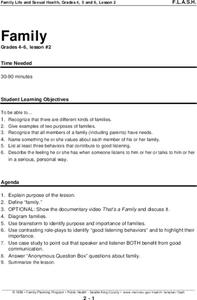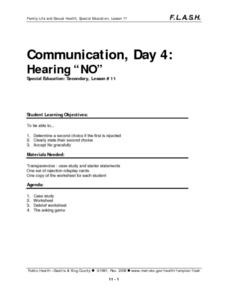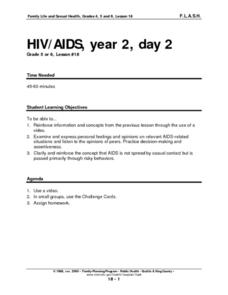Baylor College
Bio Build-up
Trace pollutants through the environment in the seventh lesson of this series on the science of food. Looking at a picture of the plants and animals in an aquatic ecosystem, learners use dot stickers to represent harmful chemicals as...
Baylor College
They're Everywhere: Bacteria
Totally gross out your class with the eighth lesson in this series on food science. Explore the microscopic world of bacteria by taking swabs of different classroom objects and growing colonies in petri dishes. An engaging activity that...
Baylor College
What's That Food?
Get things cooking with the first lesson in this series on the science of food. Working in small groups, young scientists make and record observations about different mystery foods. These descriptions are then shared with the class and...
Baylor College
Healthy Snacks
Assess your pupils' ability to identify healthy food choices in the final lesson of this series on food science. Given five different food labels, young nutritionists will rank them from most to least healthy, supporting their choices...
Baylor College
Using Food Labels
Help your class make sense of nutrition labels with the ninth lesson of this series. After explaining the different information provided on packaged food labels, perform an activity that demonstrates the amount of sugar in a single can...
Baylor College
Lungometer
Life science learners construct lung-o-meters from gallon-sized milk jugs and then measure their lung capacities. For older students, have them graph the vital lung capacities of each person in the class. Cross-curricular pieces are...
Baylor College
What is Air? Pre-Assessment
First, estimate existing knowledge about air with a class discussion. Then, hand out a 10-question pre-assessment quiz to record how much pupils know to compare to their knowledge later. This will also give mini meteorologists the...
Baylor College
Microbes and Disease
Discuss how diseases have impacted human history. Divide your class into groups and assign each group one of the following: tuberculosis, malaria, plague, cholera, smallpox, and AIDS. They read up on, complete a concept map, and present...
Bully Free Systems
Bully Free Lesson Plans—11th Grade
It takes courage to stand up to bullies. Two sample lessons from a complete Bully Free curriculum, "Courageous and Brave Bystanders" and "Assertiveness Skills for Bullied Students and Empowered Bystanders" provide participants with...
Bully Free Systems
Bully Free Lesson Plans—12th Grade
Two sample lessons from a curriculum unit on bullying provide high school seniors with an opportunity to assess their online and cell phone behavior and to consider how they can offer support to bullied students. Each plan includes an...
Baylor College
Calculating Exponential Growth
There can be a steep learning curve when teaching about exponential growth, but the lesson helps kids make sense out of the concept. When talking about exponential growth of viruses, learners may not be very interested, but when you are...
Baylor College
Modeling an HIV Particle
Models are an important part of science; they help us see the world on a scale that works for us. In the first of five lessons on HIV, learners make a paper model of the HIV virus that is about 500,000 times larger than the actual virus....
Baylor College
HIV/AIDS in the United States
In the final of five lessons about HIV/AIDS, groups create presentations to share data about the infection rates in the United States, examining demographic and geographic trends over the past ten years. Depending on how much time you...
Baylor College
The Variety and Roles of Microbes
Mini microbiologists play a card game in which they group microorganisms by groups: virus, fungus, protist, or bacteria. Then they identify the roles different microbes play in the natural world and explore how humans effectively use...
Baylor College
Milestones in Microbiology
Life science learners read a set of six short Discovery Readings that describe historical events in the field of microbiology. For each, they identify clues about when the event occurred and then they try to arrange events in...
Baylor College
Post-Assessment: And Now, What Do You Know About Microbes?
Your life science class works in their groups to review the concept maps that they have constructed over the course of a microbiology unit. They share what they have learned with the rest of the class. In a second session, they are given...
Curated OER
Communication: Saying No
Students read about psychology by identifying uncomfortable teenage situations. In this sexual awareness lesson, students read assigned text which discusses the importance of saying "no" when you are in a hostile or uncomfortable...
Curated OER
Family
Learners investigate the purpose, needs, and behaviors of a variety of configurations of families. The benefits of good communication skills among family members are emphasized in this lesson.
Curated OER
Communication, Day 2: Assertiveness
Students read examples of statements and label them assertive or non-assertive. They demonstrate assertive body language and model it in given situations. They answer questions to end the lesson.
Curated OER
Communication, Day 4: Hearing "No"
Learners read a case study about communicating with others. They identify a second choice if their first item is rejected. They practice accepting "no" as an answer and complete a worksheet.
Curated OER
HIV/AIDS, Year 2, Day 1
Students discover that HIV is a blood-borne virus which attacks to the body's immune system. They see the difference between being infected with HIV and being diagnosed with AIDS. They discuss which behaviors are safe and which are not.
Curated OER
V/AIDS, Year 2, Day 2
Learners examine and express personal feelings and opinions on relevant AIDS-related situations and listen to the opinions of peers. They practice decision-making and assertiveness. They watch a video on AIDS awareness.
Curated OER
Dissolved Oxygen
Students examine characteristics of dissolved oxygen. Given a stream temperature, and stream conditions, students study the relationships of the dissolved oygen in a stream, in organic waste loads.
Curated OER
Mandalas: Geometric Link between Medicine and Histor
Students explore Mandalas. They observe a PowerPoint presentation explaining the history of Mandalas and the Aztecs of Mexico. Students discover the connections between geometry, medicine, and ancient history. They describe the geometric...

























